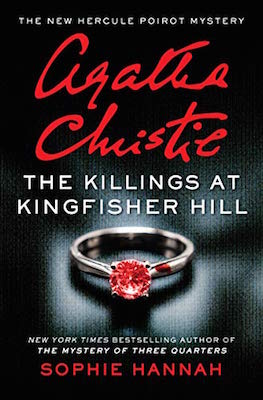
After making her astonishing announcement, the woman with the unfinished face clammed up so determinedly that further debate proved impossible. Ignoring the outraged splutterings of Alfred Bixby (“The very idea, M. Poirot! A murder on a Kingfisher Coach Company motor-coach? Such a thing would never happen!”), Poirot ordered the driver to stop so that he could take the unhappy woman outside and attempt to get to the bottom of it all.
I had started down the aisle, intending to join them, but a sharp look from Poirot told me that I was not invited. The driver had parked the coach by the side of whatever road we were on. I am familiar with most parts of London, but I did not recognize this nondescript row of houses and shops. There was a milliner’s, and one building that stood higher than the rest, with a large sign attached to its front that read “McAllister & Son Ltd. Disposal of Premises—Clearing Sale of Entire Stocks at a Remarkable Discount.” None of us knew how long we would have to wait while Poirot conducted his private conversation outside. Whispering had broken out all over the coach, and the tone of most of it was anxious.
“Catchpool.”
I looked up to find Poirot in the aisle beside me.
“Come outside, please.”
“I thought you wanted me to—”
“Follow me.”
We walked around the side of the coach and found the cause of our delay hunched over and shivering by a wall.
“Here is Inspector Catchpool!” Poirot presented me to her as if I had not already introduced myself. As he did so, I realized that I was still holding the rules of Peepers in my hand. Hurriedly, I folded the paper and put it in my pocket.
She looked up as I approached. “No,” she said. “It wasn’t him. It definitely wasn’t him. I’m sorry, I must have got it all mixed up in my memory.”
“What’s this about?” I asked Poirot. “Who was not me?”
“The gentleman who told our friend here that she would be murdered if she sat in the seat immediately to the right of the aisle in the seventh row.”
“What? Are you suggesting—”
“I suggest nothing, Catchpool. Mademoiselle, did you not tell me less than two minutes ago that the man who gave you this warning was the very same man with whom you had conversed before we all boarded the motor-coach? This man, Inspector Catchpool, who stands before you now?”
“Yes, I said so. But as soon as I saw his face again, I knew I’d been wrong,” she wailed.
“There is a resemblance, though, between Catchpool and the man who said you would be murdered if you sat in that particular seat?”
“Yes, sir! They’re both tall, with the same color of hair. But . . . the other man had funny eyes.”
“Funny in what way?” asked Poirot.
“I don’t know! I can’t explain it.”
“Before, when we were waiting to depart, you demanded to know the identity of Inspector Catchpool, did you not?”
The woman nodded.
“Was that because you thought then that he was the man who had given you this strange warning?”
“No!” she cried, apparently alarmed by the suggestion. “No, I . . . I don’t remember what I was thinking then. It seems so long ago.”
“Less than thirty minutes have passed since then,” Poirot told her. “I do not find dishonesty impressive, mademoiselle, and there is something I find less impressive still: dishonesty that includes the pretense of the amnesia! You cannot confabulate an adequate story. Eh bien, it is most convenient for you, this sudden loss of memory!”
“I’ve been honest all my life,” the woman sobbed. I felt a pang of sympathy for her. “There are things I do not wish to tell you—things I cannot tell you. The truth is . . . I did not think Inspector Catchpool could be who he claimed to be because . . . well, because I was afraid of what might happen to me! On the coach. It all seemed so unlikely.”
We waited for her to say more.
“I have been scared ever since the man warned me I might be killed! Well, who wouldn’t be? A complete stranger appears from nowhere to tell you you’ll be murdered if you sit in a particular seat on a coach . . . Who wouldn’t be scared when it came to it? That was why I was in the state I was in. And then he comes from nowhere”—she pointed at me—“and starts asking me questions. What was I supposed to think? I’ll tell you what I thought. ‘Is this the man who’s come to murder me if I sit in the wrong seat? Is he only pretending to be a policeman?’ Not that I believed what the first man had told me, not entirely. That’s to say, why on earth should anyone wish to kill me? I’ve never harmed a single soul.”
“And why do it in the enclosed space of a moving vehicle, surrounded by people who would surely witness the crime as it was committed?” Poirot murmured. “Mademoiselle, please explain to me: if you believed there was even the smallest chance you would be killed, why did you not decline to board the motor-coach?”
At this question, she seemed to tremble with fear. “I . . . I . . .”
“Calm yourself, mademoiselle. Tell the truth to Hercule Poirot and all will be well. That I promise you.”
__________________________________


